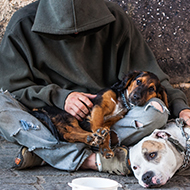
The charity supports the pets of people experiencing homelessness.
The National Office of Animal Health (NOAH) has chosen StreetVet as its charity of the year.
StreetVet, a multi award-winning charity led by veterinary professionals, provides free essential veterinary care to people experiencing homelessness, and has helped to care for more than 1,200 dogs and 100 cats since its launch in 2016.
The charity provides health checks and vaccinations, owner education, prescription and follow up, preventative medicine, surgery and daily essentials for pet owners.
Dawn Howard, chief executive of NOAH, explained why StreetVet was chosen: “We have seen how much people are supported by the relationship they have with their animals, and this is particularly true for many people living on the streets.
“The health and welfare of their animal companions is often a major priority for them, and the work of StreetVet means these animals can access the veterinary care they need and deserve. To know their best friend can be kept healthy not only helps the animal, but also must provide reassurance for the owner too.”
A donation will be made to StreetVet from sales of the 2022 NOAH Compendium book, alongside other support.
Co-founder, clinical director and brand ambassador for StreetVet, Jade Statt, thanked NOAH for its support: “StreetVet are delighted to have been selected by NOAH as their charity of the year.
"StreetVet is the product of collaboration and we are only able to deliver our services because of the immense support we have received from the profession. Thank you to NOAH for helping us raise awareness and vital funds.”



 The Veterinary Medicines Directorate (VMD) is inviting applications from veterinary students to attend a one-week extramural studies (EMS) placement in July 2026.
The Veterinary Medicines Directorate (VMD) is inviting applications from veterinary students to attend a one-week extramural studies (EMS) placement in July 2026.